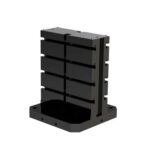Leading PCB Design Software Company Introduces Comprehensive Curriculum and Resources for Teaching Electronic Design
Altium, a global leader in PCB design software, has announced the launch of a new electronic design program tailored specifically for colleges and universities. The program aims to equip the next generation of engineers with the skills and tools needed to excel in the rapidly evolving field of electronic design.
Program Overview
The Altium Electronic Design Program for Colleges and Universities is a comprehensive initiative that includes:
- Curriculum resources and teaching materials
- Access to industry-leading PCB design software
- Training and support for educators
- Opportunities for student projects and competitions
“We recognize the critical role that colleges and universities play in preparing students for successful careers in electronic design,” said Ted Pawela, Chief Ecosystem Officer at Altium. “By partnering with educational institutions, we aim to bridge the gap between academia and industry, ensuring that graduates are well-equipped to tackle real-world challenges.”
Curriculum Resources
At the heart of the program is a robust set of curriculum resources designed to support educators in teaching electronic design principles and practices. These resources include:
- Lecture slides and notes
- Lab exercises and projects
- Sample designs and case studies
- Assessments and quizzes
The curriculum covers a wide range of topics, from basic electronics theory to advanced PCB layout techniques. It is designed to be flexible and modular, allowing educators to customize the content to fit their specific course requirements.
| Topic | Description |
|---|---|
| PCB Design Fundamentals | Introduction to PCB design concepts and tools |
| Schematic Capture | Creating and managing schematic diagrams |
| Component Libraries | Building and organizing component libraries |
| PCB Layout | Placing and routing components on a PCB |
| Design for Manufacturing (DFM) | Techniques for designing manufacturable PCBs |
| Signal Integrity | Analyzing and optimizing signal integrity in PCB designs |
| EMC/EMI | Designing for electromagnetic compatibility and interference |
Access to Industry-Leading Software
As part of the program, participating institutions will receive access to Altium Designer, the industry-leading PCB design software used by thousands of companies worldwide. Students and educators will have the opportunity to work with the same tools used by professionals, gaining valuable hands-on experience.
Altium Designer offers a comprehensive set of features for PCB design, including:
- Schematic capture
- 3D PCB layout
- ECAD/MCAD collaboration
- Signal integrity analysis
- Manufacturing outputs
By using Altium Designer, students will develop proficiency in a widely-used tool, enhancing their employability upon graduation.
Training and Support
To ensure the success of the program, Altium will provide training and support for educators. This includes:
- Online training courses
- Webinars and workshops
- Technical support
- Access to the Altium community forum
Educators will have the opportunity to learn best practices for teaching electronic design, as well as stay up-to-date with the latest features and enhancements in Altium Designer.
Student Projects and Competitions
The Altium Electronic Design Program for Colleges and Universities will also feature opportunities for student projects and competitions. These initiatives will provide students with the chance to apply their skills to real-world design challenges, showcase their work, and compete with their peers.
Some potential student projects and competitions include:
- PCB design contests
- Robotics competitions
- Wearable technology challenges
- Sustainable energy projects
By participating in these activities, students will gain valuable experience, build their portfolios, and network with industry professionals.
Benefits for Students
The Altium Electronic Design Program offers numerous benefits for students, including:
- Hands-on experience with industry-leading tools
- Exposure to real-world design challenges
- Opportunities to showcase skills and work
- Enhanced employability upon graduation
“As a student, having access to Altium Designer and the comprehensive curriculum resources has been invaluable,” said Sarah Johnson, a senior electrical engineering student at the University of California, Berkeley. “I feel much more confident in my ability to tackle complex design projects and am excited about the opportunities that await me after graduation.”
Benefits for Educators
Educators also stand to benefit greatly from the Altium Electronic Design Program:
- Access to comprehensive teaching materials
- Training and support from industry experts
- Opportunities to collaborate with other institutions
- Enhanced student engagement and outcomes
“The Altium Electronic Design Program has revolutionized the way we teach PCB design,” said Dr. Mark Thompson, an associate professor of electrical engineering at the Massachusetts Institute of Technology. “The curriculum resources and software access have allowed us to provide our students with a more immersive and practical learning experience, better preparing them for successful careers in the industry.”

Participating Institutions
Since the launch of the program, numerous colleges and universities worldwide have already partnered with Altium to implement the Electronic Design Program. Some of the participating institutions include:
- Massachusetts Institute of Technology (MIT)
- Stanford University
- University of California, Berkeley
- Imperial College London
- Nanyang Technological University, Singapore
- University of Sydney, Australia
As the program continues to gain momentum, Altium expects to welcome many more institutions in the coming months.
Industry Perspectives
The Altium Electronic Design Program has garnered significant attention from industry leaders, who recognize the value of partnering with educational institutions to develop the next generation of electronic design professionals.
“At Intel, we are always looking for ways to support and nurture young talent in the field of electronic design,” said Lisa Chen, Director of University Relations at Intel. “Altium’s program aligns perfectly with our goals, and we are excited to see the impact it will have on the future of our industry.”
Other industry partners, such as Texas Instruments, Analog Devices, and Keysight Technologies, have also expressed their support for the program and are exploring ways to collaborate with Altium and participating institutions.
Future Outlook
As the demand for skilled electronic design professionals continues to grow, initiatives like the Altium Electronic Design Program will play an increasingly important role in bridging the gap between academia and industry. By providing students with access to cutting-edge tools, comprehensive curriculum resources, and real-world experience, Altium and its partners are helping to ensure a bright future for the field of electronic design.
“We are thrilled to see the early success of the Electronic Design Program and are committed to expanding its reach and impact in the years to come,” said Ted Pawela. “By working together with colleges and universities, we can empower the next generation of innovators and leaders in our industry.”
Frequently Asked Questions (FAQ)
-
Q: How can my institution participate in the Altium Electronic Design Program?
A: To participate in the program, please contact Altium’s education team at [email protected]. They will provide you with more information about the program requirements and onboarding process. -
Q: Is there a cost associated with participating in the program?
A: Altium offers special pricing and licensing options for educational institutions. Please contact the education team for more details on pricing and packages. -
Q: Can the curriculum resources be customized to fit my institution’s specific needs?
A: Yes, the curriculum resources are designed to be modular and flexible. Educators can easily adapt and customize the content to align with their course requirements and learning objectives. -
Q: What kind of support is available for educators and students in the program?
A: Altium provides comprehensive training and support for educators, including online courses, webinars, and technical assistance. Students will also have access to the Altium community forum, where they can connect with peers and industry experts. -
Q: How can industry partners get involved in the Altium Electronic Design Program?
A: Industry partners are encouraged to reach out to Altium’s education team to explore collaboration opportunities, such as sponsoring student competitions, providing internships, or offering guest lectures. By working together, we can create a more robust and dynamic learning experience for students.






Leave a Reply